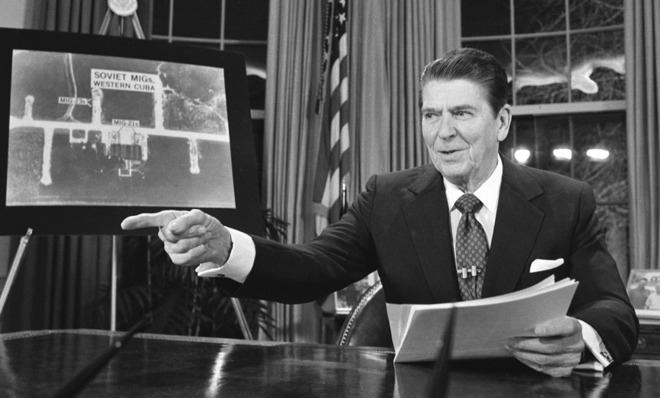Inside a top secret military exercise


A free daily email with the biggest news stories of the day – and the best features from TheWeek.com
You are now subscribed
Your newsletter sign-up was successful
On November 7, 1983, the terminal phase of a NATO war game called Able Archer began, deep within a bunker somewhere in Europe. The U.S. and NATO conducted dozens of such exercises each year. But Able Archer was special. It marked the first time that NATO practiced brand new procedures for sharply changing the course of its fictitious war with the Russians from conventional — regular bombs — to nuclear. And the Russians noticed. Not only did they notice, but the available evidence suggests that they panicked and reacted, thinking the war game was a pretext for an actual war. The exercise became very real.
Historians debate how (or whether) this incident changed U.S. policy, and I'm writing a book about it. So much about Able Archer and its aftermath remains classified, and the folks at the National Security Archive are doing yeoman's work to try and pry those expired secrets loose.
The Reagan administration did not stop exercising its nuclear forces, but it tightened the procedures for approving them. The National Security Adviser had to sign off on all "significant military exercises" from thence forth. Of the dozens conducted after Able Archer, most remain classified. A few have made it through. In April and May of 1985, the Department of Defense held a joint field training and command post exercise called SOLID SHIELD. The exercise, according to a document I obtained from the Reagan Library, "is designed to test and evaluate our capability to field combined U.S.-U.K task forces in a convectional war scenario."
The Week
Escape your echo chamber. Get the facts behind the news, plus analysis from multiple perspectives.

Sign up for The Week's Free Newsletters
From our morning news briefing to a weekly Good News Newsletter, get the best of The Week delivered directly to your inbox.
From our morning news briefing to a weekly Good News Newsletter, get the best of The Week delivered directly to your inbox.
More than 42,000 U.S. troops would participate directly, on bases all over the eastern United States.
The pre-exercise memorandum prepared by Oliver North, who ran the exercise program on the National Security Council, contains clues to the sensitivity of post-Able Archer nuclear games. Since the exercise was to be held in the U.S., "no significant regional political implications are expected, although increased Soviet and Cuban surveillance is expected." The Pentagon would stand up a public affairs team to make sure that no one got the wrong idea. And the media would be allowed to cover most of the exercise.
Most of it. Even though SOLID SHIELD professed to test "conventional" war scenarios, it included a simulated release of tactical nuclear weapons. That means that the still-classified conventional war plan against Warsaw Pact states allowed for the use of tactical nuclear weapons within a conflict that the U.S. would still deem to be conventional.
The Soviets were not paranoid, after all.
A free daily email with the biggest news stories of the day – and the best features from TheWeek.com
Marc Ambinder is TheWeek.com's editor-at-large. He is the author, with D.B. Grady, of The Command and Deep State: Inside the Government Secrecy Industry. Marc is also a contributing editor for The Atlantic and GQ. Formerly, he served as White House correspondent for National Journal, chief political consultant for CBS News, and politics editor at The Atlantic. Marc is a 2001 graduate of Harvard. He is married to Michael Park, a corporate strategy consultant, and lives in Los Angeles.
-
 Trump’s EPA kills legal basis for federal climate policy
Trump’s EPA kills legal basis for federal climate policySpeed Read The government’s authority to regulate several planet-warming pollutants has been repealed
-
 Political cartoons for February 13
Political cartoons for February 13Cartoons Friday's political cartoons include rank hypocrisy, name-dropping Trump, and EPA repeals
-
 Palantir's growing influence in the British state
Palantir's growing influence in the British stateThe Explainer Despite winning a £240m MoD contract, the tech company’s links to Peter Mandelson and the UK’s over-reliance on US tech have caused widespread concern
